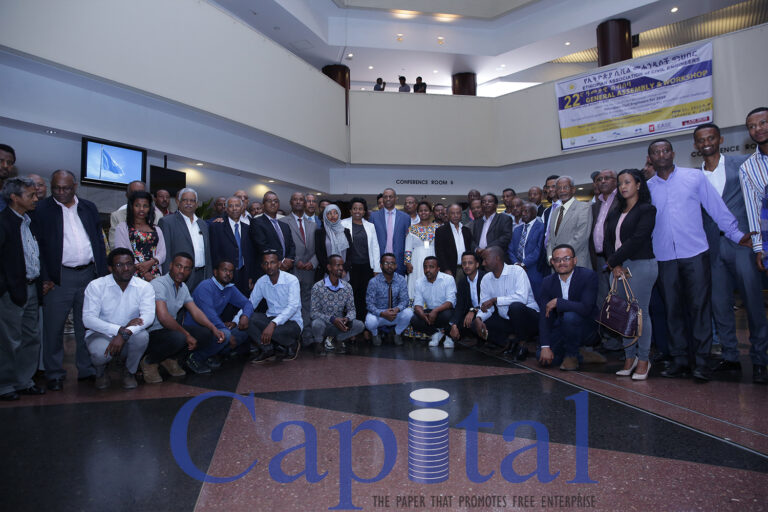Ethiopian Association of Civil Engineers (EACE) vows to fight theft from the construction sector that has been associated with the profession of civil engineering.
This is said while the Association conducted its 22nd General Assembly and hosting a technical workshop at the UNECA conference hall, under the theme “The role of Civil Engineering Profession towards overcoming the expected Grand Challenges Ethiopia faces by the year 2050” last Saturday January 4, 2020.
“White elephants become growing, from time to time in the construction industry; deep engagement to redefine and change the perception of the profession is order of the day” said Tesfaye Workineh, president of EACE.
The need to strengthen construction audit was one of the four papers presented during the assembly in the presence of Kalid Abdurahim, State Minister of Ministry of Urban Development and Construction.
“The construction sector should fight corruption to deliver projects that are up to international standards and stand the test of time,” Prime Minister Abiy Ahmed said at the opening ceremony of the second National Construction Sector Movement at UNECA on the 2nd of January.
The absence or scant attention given for contraction audit significantly hurts the country’s economy mentioning failed grand and emblem projects.
“Luck of strong construction audit both at the system and project level, brought undesirable consequences instead of add values” said Professor Shiferaw Taye, co-founder of Ethiopia 2050 Grand Challenges and Opportunities and advisor to Minister of Urban Development and Construction.
According to Prof. Shiferaw, the government still gives little attention for construction audit that has a huge impact to deter or minimize the failures of various projects including meeting the quality of the infrastructure.
Construction audit had started four years ago and it is established under a directorate level at the ministry which professionals take as a signal of less attention paid by the government.
Construction audit is nothing rather “trust but verify’ that adds ample values to the industry through positive influencing that address the entire implementation of and delivery process, he adds.
EACE is also actively participating in the 2050 grand challenges and opportunities in construction industry where they advised the industry to led and managed through relevant and informed knowledge per the master plan and roadmap established for the purpose; not through instinct alone! Where all actors and stakeholders work positively towards the development of the Industry and where they are accountable.
Association vows to fight theft from the sector
Procurement Service to go online
The Public Procurement and Property Disposal Service (PPPDS) is to change its manual procurement process with automated one.
The service that is responsible to handle massive procurement for the federal government is procuring billion of birr worth of goods and services from local and international suppliers. However the manual procurement has made the process to take unnecessary time and vulnerable for corruption.
Tsewaye Muluneh, Director General of PPPDS, told Capital that the procurement process of other countries is automated and that makes their activity fast and easy.
“Besides it accelerate the procurement process and tackle the corruption practices, we can manage to handle massive purchase in a given time,” Tsewaye told Capital.
“I have already tabled the case for the board that overview the Service which is chaired by Minister of Finance,” she added.
The board has accepted the proposal and already the process to commence the modern system is being undertaken by the Ministry of Innovation and Technology (MInT).
“I have information that the initial work is finalized by MInT,” the Director General added, “we expect we will review the initial work that the innovation body come up with in the coming days.”
She said that the transition to automation will change the operation of PPPDS.
At the current stage the procurement process takes a very long period that limits the capacity of PPPDS, while it is handled easily in other countries, according to Tsewaye.
She believes that the automation will save significant sum of money of the public and boost the advantage of economic of scale that is the target of PPPDS.
“My vision for this pubic organization is to computerize all its operation,” she asserted.
“At the initial stage we will use the technology of MInT but the Public Procurement and Property Administration Agency, which is supervisory of PPPDS, is working on higher scale for the modernization,” she added.
The major share of the annual budget that sometimes consume more than 60 percent of the government budget is procurement and it may take 15 percent of the total gross domestic product of the country.
Marathon Motors launches three new locally assembled Hyundai models
Marathon Motors Engineering launched three newly locally assembled vehicles at its plant.
The All New Palisade SUV is estimate cost of 6.5 million birr. There’s seating for up to eight passengers with a surprisingly upscale interior.
The All New Atos 1,1-litre, four-cylinder petrol engine which will push out 50 kW of power at 5 500 r/min and an impressive 99 Nm of torque when running at 2 800 r/min, the New Atos has a top speed of 148 km/h and comes with 850,000 birr price.
Mighty EX8 Cargo Truck has payload capacity of 40-45 quintals and estimated to cost around 1.5 million birr.
Beside these three new models, the joint venture firm is planning to assemble Electric cars in the coming three months, which can be charged at a house hold level with 220 volt, the car will have the capacity to go more than 300 km by charging six hours.
Founded almost a decade ago, as importers and distributors of Hyundai passenger and commercial vehicles and parts in Ethiopia, Marathon imports 500-600 cars annually and currently has the capacity to assemble 10,000 of cars annually and introduce 12 new models. Marathon Motors is not the only sole assembler of South Korean made vehicles in Ethiopia. There are a total of 19 companies that are registered at the Ministry of Trade & Industry to assemble motor vehicles, of which nine are owned by non-nationals.
Ethiopian passport 96th on 2020 global index
By Ruth Brook
Ethiopian passport holders can now visit 43 countries without visa, according to the Henley Passport Index 2020 Report – the original ranking system of all the worlds’ passports according to the number of countries they can visit without a visa, or with a visa upon arrival.
The index ranks countries using a visa free/visa-on-arrival score. With a score of 43, Ethiopia is placed 96th out of 199 passports on the 2020 global ranking, sharing the position with neighboring country South Sudan. The 43 counties -majority of which are in Africa – are made up 10 in Asia, 19 in Africa, 6 in Oceania, 5 in the Caribbean, 2 in the Americas and 1 in the Middle East.
The previous decade had seen a slight fluctuation in position for the Ethiopian passport which started off the last decade with a ranking of 92 on the index. 2015 saw Ethiopia’s lowest ranking to date at 104 on the index. The last three years have seen a hike for the Ethiopian passport, placing 99th in 2018, 97th in 2019 and 96th at the start of the new decade.
”Over the past few years, we have seen the world adapt to mobility as a permanent condition of global life. The latest rankings show that the countries that embrace this reality are thriving, with their citizens enjoying ever-increasing passport power and the array of benefits that come with it,” said Dr. Christian H. Kaelin, Chairman of Henley & Partners and the inventor of the passport index concept.
The Henley Passport Index started in 2006, analyzing visa regulations of all the countries and territories since its conception. The data is maintained by the world’s largest and most accurate database of travel information powered by the International Air Transport Association, the report stated.
The 2020 report takes into consideration current global affairs and the “realities shaping our world”. It offers exclusive insight into mobility and migration patterns, and looks at predictions for the coming year as migration becomes a perpetual condition of life.
“Migration, as with almost everything else, is a function of supply and demand — and, increasingly, it is accepted that more migration creates more demand, stimulating much needed economic growth. As the world economy heads into a synchronized slowdown, we must view migration as part of the solution, not the problem,” commented, Dr. Parag Khanna, bestselling author and the Founder and Managing Partner of FutureMap in Singapore.
The majority of passports assuming the top 10 seats belong to Asian countries, the report revealed. The number one spot on the 2020 index is held by the Japanese passport, with a score of 191, indicating visa-free access to 148 more countries than the Ethiopian passport. On the tail end of the index is the passport of Afghanistan, with visa-free access to only 26 countries.
“While the latest results from the Henley Passport Index show that globally, people are more mobile than ever before, they also indicate a growing divide when it comes to travel freedom,” the report stated.








